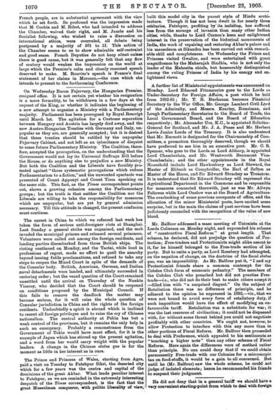Mr. Balfour addressed a mass meeting of Unionists at the
Leeds Coliseum on Monday night, and expounded his scheme of ",constructive Fiscal Reform" at great length. That scheme, he declared, did not prejudge the question oi Pro- tection; Free-traders and Protectionists might alike assent to it, for he himself belonged to the Free-trade section' of his party. But to unite a party, as Lord Rosebery had attempted, on the negation of change, on the doctrine of the fiscal status quo, was an impossibility. As Mr. Balfour put it, "1 and my Protectionist friends share a common contempt for • the Cobden Club form of economic pedantry." The members of the Cobden Club who preached but did not practise Free- trade—i.e., who did not do their best to make others accept it —filled him with "a surprised disgust." On the subject of Retaliation there was no difference of principle, and he adhered to the opinion be expressed in 1892,—viz., that we were not bound to avoid every form of retaliatory duty, if such imposition would have the effect of modifying an un- favourable tariff. Retaliation was a substitute for war; it was the last resource of civilisation; it could not be dispensed with, for without some threat behind you could not negotiate profitably with other countries. We ought not, however, to allow Protection to interfere with this any more than in other portions of Fiscal Reform. Mr. Balfour then proceeded to deal with Preference, which appealed to his sentiments as " touching a higher note" than any other scheme of Fiscal Reform. Here again the differences were of method rather than principle. No one could deny that if we could obtain permanently Free-trade with our Colonies for a microscopic tax on food-stuffs, it would be a gain to all concerned. But until he (Mr. Balfour) saw the whole scheme, he could not judge of isolated elements; hence he recommended his friends to suspend their judgment.
He did not deny that in a general tariff we should have a very convenient starting-point from which to deal with foreign






































 Previous page
Previous page